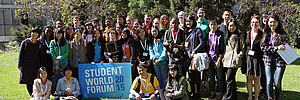Publication date: 05/05/15
ThemesHeadline news
From 19 to 24 April, the University of Strasbourg hosted the 6th Student World Forum of the Academic Consortium for the 21st Century, in partnership with the University of Freibourg.
For this occasion, 38 students from the 5 continents were introduced to European issues and exchanged ideas on local and regional democracy as well as on cross-border projects. They also explored Strasbourg’s history and heritage during cultural tours around the city.
Although they all had different backgrounds, the participants showed a common interest in the European Union and in cross-border collaboration, as well as a strong will to understand the EU though their own national specificities. “I study history: it is fascinating to come here and see how Europe managed to overcome its history,” said Tamika from Adelaide (Australia). Sipjosihle, a South-African student from Stellenbosch, explained: “The EU is a symbol of the way different countries can unite to promote peace, human dignity and human rights. I think this is something my country and my continent really need.”
A week full of discoveries
The participants showed a real interest towards the week’s programme and the visits, conferences and workshops took place in an enthusiastic atmosphere.
The week started with a visit of the European Parliament and the Council of Europe, followed by a conference on the role of regional cooperation in supporting the promotion of human rights and the defense of environmental projects. The students also became acquainted with the principles of the European Charter of Local Self-Government, which defines subsidiarity.
This charter formed the basis of their first workshop, which gave them the opportunity to think about innovative ways to promote cross-border cooperation in a given region. In small working groups, the participants managed to present relevant and well thought-out projects. They mostly thought of ways to bring populations of various nationalities and languages together and imagined cultural policies to foster understanding and harmony between different communities. They also attended a presentation of the European Campus project, which provided an insight into the issues of implementation of a concrete cross-border project. The concept of a campus without borders aroused the students’ interest.
On Wednesday, 22nd of April, the group went on a day trip to Freiburg in order to learn more about the sustainable development policies lead by the city, notably in eco-districts.
On Thursday, the students had to reflect on how to develop a product in a cross-border context. A closing ceremony at the Haut-Koenigsbourg castle On the last day of the Forum, the 38 participants joined their home universities’ representatives for a closing ceremony at the Haut-Koenigsbourg medieval castle, where they presented their group projects and looked back at how the week unfolded. Each group recapped the highlights of the week and was given a participation certificate co-signed by the universities of Strasbourg and Freiburg. Cultural exchanges and friendship were at the core of the forum’s programme, and the participants made the most of their cultural differences to develop friendly ties and make this week an unforgettable experience.
Lucie Gonin
Traduction: Camille Frank
This charter formed the basis of their first workshop, which gave them the opportunity to think about innovative ways to promote cross-border cooperation in a given region. In small working groups, the participants managed to present relevant and well thought-out projects. They mostly thought of ways to bring populations of various nationalities and languages together and imagined cultural policies to foster understanding and harmony between different communities. They also attended a presentation of the European Campus project, which provided an insight into the issues of implementation of a concrete cross-border project. The concept of a campus without borders aroused the students’ interest.
On Wednesday, 22nd of April, the group went on a day trip to Freiburg in order to learn more about the sustainable development policies lead by the city, notably in eco-districts.
On Thursday, the students had to reflect on how to develop a product in a cross-border context. A closing ceremony at the Haut-Koenigsbourg castle On the last day of the Forum, the 38 participants joined their home universities’ representatives for a closing ceremony at the Haut-Koenigsbourg medieval castle, where they presented their group projects and looked back at how the week unfolded. Each group recapped the highlights of the week and was given a participation certificate co-signed by the universities of Strasbourg and Freiburg. Cultural exchanges and friendship were at the core of the forum’s programme, and the participants made the most of their cultural differences to develop friendly ties and make this week an unforgettable experience.
Lucie Gonin
Traduction: Camille Frank
















